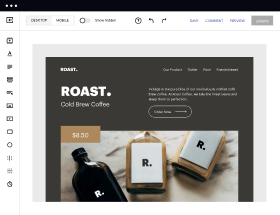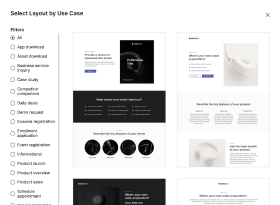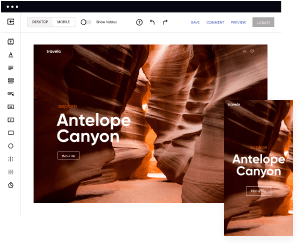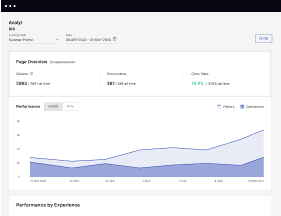Bring your ideas to life with Instapage's basic team members page template
Unleash your creativity with the basic team members page template. Try Instapage today.

Easy to build without coding
With the intuitive drag-and-drop builder, anyone on your team can create high-converting pages without any knowledge of code or design. Make enhancements to your landing page with custom widgets using Javascript, HTML/CSS, or third-party scripts.
Multiple layouts for any industry and goal
Select from 500+ landing page layouts built to boost conversions across industry-specific scenarios. Customize them by adjusting fonts, adding images, and generating on-brand content with the AI assistant. Quickly scale with Instablocks® and Global Blocks that you can save, reuse, and update globally.
Loads fast and looks polished on any device
Every template is responsive, which means they present professionally on any device and load blazingly fast with our Thor Render Engine. You can also power them up with Google AMP technology to deliver an unparalleled mobile experience and drive higher conversions.
Robust analytics & experimentation
Get real-time updates and reporting across all your devices, showing the number of visitors, conversions, cost-per-visitor, and cost-per-lead. Launch AI-powered experiments, run A/B tests, and use heatmaps to analyze user behavior, then optimize your landing page to maximize conversions.
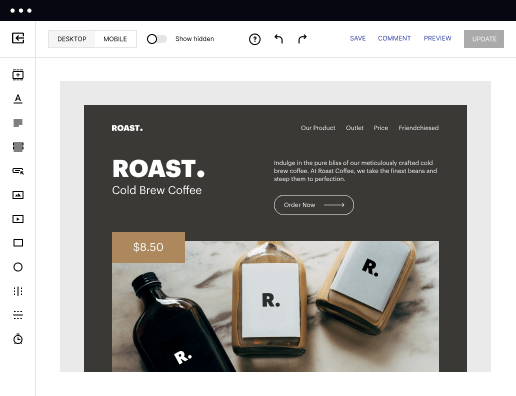
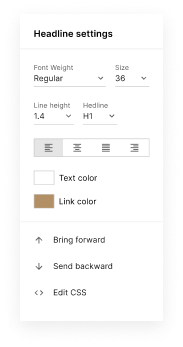
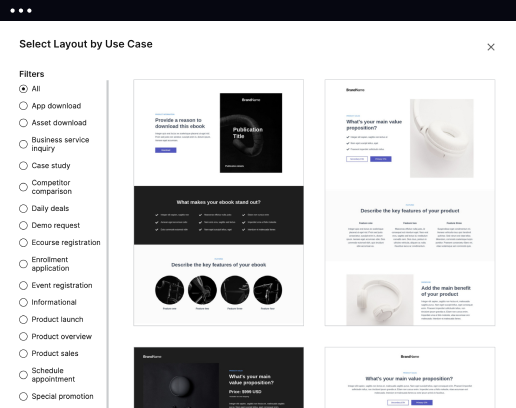
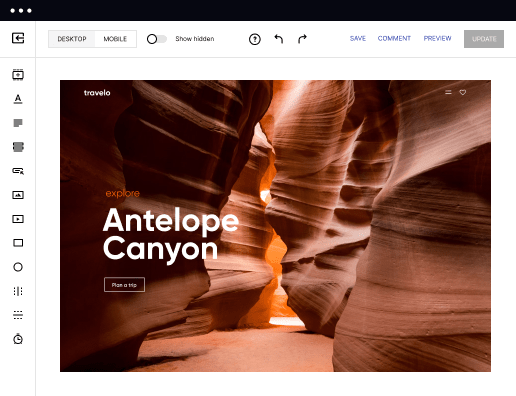
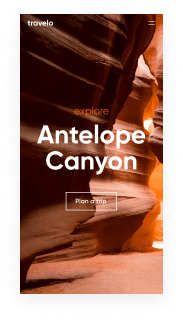
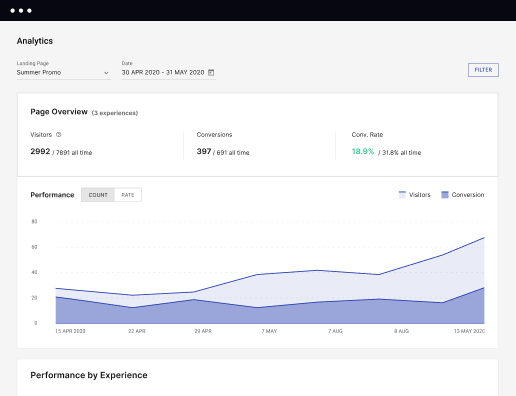
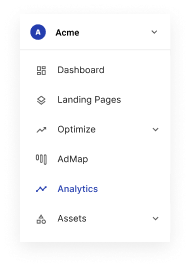
Easy to build without coding
With the intuitive drag-and-drop builder, anyone on your team can create high-converting pages without any knowledge of code or design. Make enhancements to your landing page with custom widgets using Javascript, HTML/CSS, or third-party scripts.
Multiple layouts for any industry and goal
Select from 500+ landing page layouts built to boost conversions across industry-specific scenarios. Customize them by adjusting fonts, adding images, and generating on-brand content with the AI assistant. Quickly scale with Instablocks® and Global Blocks that you can save, reuse, and update globally.
Loads fast and looks polished on any device
Every template is responsive, which means they present professionally on any device and load blazingly fast with our Thor Render Engine. You can also power them up with Google AMP technology to deliver an unparalleled mobile experience and drive higher conversions.
Robust analytics & experimentation
Get real-time updates and reporting across all your devices, showing the number of visitors, conversions, cost-per-visitor, and cost-per-lead. Launch AI-powered experiments, run A/B tests, and use heatmaps to analyze user behavior, then optimize your landing page to maximize conversions.
All the features you need to build lead-generating landing pages
Explore more featuresLearn how to build top-performing landing pages for any goal
FAQs
Leading the way in building high-performing landing pages





A step-by-step guide to using Instapage for effective landing page creation
Creating and optimizing landing pages is crucial for enhancing your digital marketing campaigns. With Instapage, marketers across various sectors like business services, education, and technology can effectively accelerate their campaign processes. This guide walks you through the key steps to maximize your ROI using Instapage's features.
Understanding Instapage: The all-in-one platform
Instapage offers a powerful platform designed to supercharge your landing page production and conversion rate optimization (CRO). Utilizing over 100 high-converting templates, this platform allows marketers to build stunning landing pages quickly, without any coding skills. The user-friendly interface ensures that your teams, regardless of size, can launch campaigns efficiently.
- 100+ high-converting templates: Easily customizable for any campaign.
- Intuitive drag-and-drop builder: Effortlessly create pages without coding knowledge.
- Pre-built lead generation elements: Integrate forms and elements that drive conversions.
Step 1: Building your landing page
Start by selecting a template that best fits your marketing objectives. Instapage's library of conversion-focused layouts allows you to tailor your message effectively. Here's how to get started:
- Choose a template: Browse through categories tailored for your industry.
- Utilize Instablocks: Use pre-designed sections to enhance layout speed.
- Customize content: Edit text, images, and forms to align with your campaign goals.
Step 2: Optimize for conversions
Optimization is key to ensuring your landing page performs well. Leverage Instapage's built-in experimentation tools and analytics.
- Conduct A/B testing: Compare variations of your landing page to see which performs better.
- Use heatmaps: Analyze user behavior on your page to identify effective areas.
- Monitor performance: Access analytics to track conversion rates and user engagement.
Step 3: Enhance personalization and collaboration
Personalizing your landing page can significantly increase conversion rates. Use dynamic text replacement to align your messaging with user expectations. Collaborate effectively with your team to ensure your page is optimized before launch.
- Dynamic text replacement: Tailor your content to match user queries.
- AdMaps: Align specific ads with unique landing pages for targeted campaigns.
- Real-time collaboration: Generate feedback and make edits instantaneously.
By following these steps, you will harness the full potential of Instapage, creating pages that not only attract but also convert visitors.
Ready to supercharge your landing page strategy? Start leveraging Instapage today for unmatched marketing performance.
Basic team members page template: A comprehensive guide
Understanding the basics: What is a team members page template?
A team members page template is a structured layout used on a website to showcase the individuals behind a business, organization, or project. This page serves to highlight the team's qualifications, roles, and contributions, creating a personal connection with visitors. The importance of such a page cannot be understated, as it builds brand credibility by providing transparency and reinforcing trust with potential clients and partners.
Moreover, a well-crafted team members page enhances user engagement by allowing visitors to connect with real people instead of faceless entities. By sharing personal anecdotes, professional achievements, and even interests, companies can foster a sense of familiarity and approachability, which can significantly improve customer relationships.
Establishes credibility and trust through transparency.
Enhances visitor engagement by showcasing real team members.
Provides a platform to highlight unique skills and experience.
HTML fundamentals: Building blocks of a team page
Understanding HTML is essential when creating a team members page template. HTML (Hypertext Markup Language) serves as the backbone of most web content, providing the structure and content that defines a webpage. Key elements like headings, paragraphs, images, and links organize information effectively, making it easier for visitors to access team member details.
Using specific HTML tags such as , , and can enhance layout and accessibility, while tags allow for the inclusion of professional photos. Implementing semantic HTML is particularly crucial for SEO, as search engines rely on this structured data to interpret page content accurately, ranking it appropriately in search results.
Using and for structuring content.
Implementing for adding team member photos.
Utilizing semantic tags to improve SEO.
Key features of team members page templates
The design of a team members page is crucial in engaging users and fostering a connection with the brand. Visual design elements such as themes, colors, and logos create a cohesive experience that resonates with a company’s identity. A well-thought-out theme can make a tremendous difference in user perception, encouraging them to explore more about the organization.
Incorporated brand colors and logos not only enhance visual appeal but also enforce brand recognition. There are several design frameworks available that can contribute to high-quality results. Frameworks such as Bootstrap and Tailwind CSS provide pre-designed components that can streamline the design process and ensure responsiveness across different devices.
Implementing cohesive themes that reflect brand identity.
Using color palettes and logos for consistency.
Leveraging design frameworks for efficiency and responsiveness.
Responsive layout options
With the growing number of mobile device users, having a mobile-friendly team members page template is not optional—it's essential. A responsive layout ensures that your page adapts to various screen sizes, improving accessibility and user experience. Techniques for achieving responsive designs include media queries and fluid grids, allowing for a flexible design that caters to all devices.
Utilizing CSS Grid and Flexbox can also make the process of creating responsive layouts more manageable. CSS Grid allows for two-dimensional layouts that can adjust based on the screen size, while Flexbox is excellent for aligning elements within a single dimension. Together, these techniques give developers the power to construct user-friendly interfaces that work seamlessly across platforms.
Implementing media queries for adaptable designs.
Using CSS Grid for two-dimensional layout management.
Applying Flexbox for dynamic and aligned element placement.
Customizable service blocks
Service blocks are designated sections on a team members page that illuminate specific roles, skills, or responsibilities of each team member. These blocks are essential because they articulate the unique contributions of each individual, allowing users to understand who does what within the organization. Customizing these service blocks with relevant information can effectively highlight your team's strengths and capabilities.
Customization options can vary, allowing teams to match the design and content with their specific branding needs. Whether it's adjusting font styles, colors, or the information displayed, customizable service blocks allow businesses to create a tailored narrative that resonates with their audience. This personalization enhances the likelihood of engagement and connection.
Defining service blocks to clarify team roles.
Highlighting skills and achievements of team members.
Providing customization for brand consistency.
Variety in team members page templates
Not all team members page templates are created equal; different industries require unique designs and functionalities. For instance, a corporate team page may prioritize formal headshots and brief bios, while a sports club might focus on action shots and player statistics. Tailoring your template to specific industry needs enhances relevance and appeal.
When designing for an industry, recognize the unique elements that resonate with that target audience. A soccer club's team page may highlight player achievements, coaching staff, and community involvement, while a tech startup might showcase engineers' backgrounds and innovations. An industry-specific approach allows for better customer connection and deeper engagement.
Adapting templates to suit industry-specific needs.
Highlighting unique elements relevant to each industry.
Enhancing relevance to target audiences with tailored designs.
Integrating multimedia for enhanced engagement
Multimedia integration plays a crucial role in making a team members page more engaging. Utilizing images, videos, and infographics can significantly enhance user interest. Professional photographs of team members combined with short video introductions create a more engaging experience, allowing visitors to connect on a personal level.
Moreover, employing icons and graphics alongside text can visually represent roles and skills, breaking the monotony of text-heavy content. Best practices for multimedia content optimization include ensuring fast loading times, maintaining image quality, and using alt tags for accessibility—measures that collectively improve both user experience and SEO.
Using professional images and video introductions for teams.
Incorporating graphics and icons for visual role representation.
Optimizing multimedia to balance aesthetics and performance.
Functionality beyond aesthetics
While the visual appeal of a team members page is important, the functionality must not be overlooked. SEO best practices should be integrated into the design process to improve visibility in search engines. Relevant keywords embedded in headings, descriptions, and alt texts can substantially enhance the likelihood of being found by potential customers.
Additionally, incorporating schema markup will enable search engines to display rich snippets in search results, further increasing click-through rates. These optimizations enhance the page’s usability, making it more appealing not just in terms of design but also in user functionality and reach.
Incorporating relevant keywords for better SEO.
Using schema markup for rich snippets in search results.
Balancing aesthetics with functionality for improved user experience.
Interactivity for enhanced user experience
Creating an interactive experience for visitors can significantly enhance their engagement with the team members page. Features such as hover effects on images, pop-ups for more information, and interactive timelines or progress bars can guide users through the content seamlessly. Each of these features acts as an invitation for deeper exploration of the team’s qualifications and contributions.
Moreover, integrating social media links encourages visitors to connect with team members beyond the website, further enhancing user interaction and engagement. This feature not only humanizes the brand but also builds community and relationship around the team and their work.
Implementing hover effects for interactive visuals.
Using pop-ups for additional information on team members.
Encouraging social media connections for broader engagement.
Utilizing templates for efficient task management
Implementing team members page templates can streamline the web development process, especially for organizations looking to launch quickly. A well-structured template allows teams to add or modify content without the need for extensive knowledge of coding, making it an efficient solution. A step-by-step approach for implementing such templates can help teams navigate the process smoothly.
When designing a page, developers can choose to modify existing templates or build new pages from scratch. Pre-built templates save time and resources, providing a foundation that can be tailored to fit the specific needs of a business. For teams, this ensures that branding remains intact while still achieving a high level of customization.
Step-by-step guide to implement team member templates.
Choosing between modifying existing templates or creating new ones.
Leveraging pre-built templates for efficiency and time savings.
Collaborating with teams to enhance design
Collaboration among team members can greatly improve the design and content quality of a team members page. Establishing an environment for creative exchange allows designers, marketers, and developers to collaborate effectively. Feedback loops should be implemented regularly to ensure continuous improvement in layout and aesthetics.
Additionally, utilizing modern tools and software can facilitate this collaboration, enabling team members to work together in real-time. This synchronous approach not only speeds up the design process but also enhances the overall quality through diverse perspectives and expertise.
Creating a collaborative environment for design optimization.
Implementing regular feedback loops for continuous improvement.
Using collaboration tools for effective teamwork.
Optimizing your team members page for different platforms
To reach the broadest audience possible, ensuring templates work across various platforms is crucial. Cross-platform compatibility allows the team members page to function well on different devices and operating systems. Developers should prioritize testing strategies that assess performance on multiple browsers to identify any potential issues.
Adapting templates for different content management systems (CMS) is also important. Whether it's WordPress, Joomla, or others, ensuring the team page template is compatible will enhance usability and improve visitor experience, making the information accessible and engaging regardless of the platform.
Ensuring functionality across various browsers and devices.
Prioritizing testing strategies for consistent performance.
Adapting templates for compatibility with different CMS.
Examples of effective team pages
Examining case studies of successful team members pages can provide valuable insights into effective design and layout. These pages often share features that enhance user engagement, such as compelling visuals, clear information, and interactive elements. Analyzing these effective examples helps identify what common practices lead to higher visitor interaction and satisfaction.
Lessons learned from these pages emphasize the importance of balancing aesthetics, content, and user experience. Each successful implementation reinforces that a team members page is not just a formality but a strategic asset that can significantly impact brand perception and customer engagement.
Highlighting case studies of exemplary team member pages.
Identifying features that enhance user engagement.
Learning lessons and best practices from successful examples.
The future of team members pages: Trends and innovations
As technology continues to evolve, the design and functionality of team members pages are likely to see significant changes. Emerging trends will likely focus on personalization, utilizing AI and machine learning to cater experiences specifically to users. This innovation makes a page dynamically responsive to individual visitor preferences, allowing greater engagement.
Future-proofing templates will also be vital in addressing the changing needs of businesses. As industries evolve, being adaptable in design and functionality ensures that team members pages can grow along with organizational demands, maintaining relevance and effectiveness.
Predicting the evolution of team pages with technology advancements.
Exploring AI and machine learning for personalized interactions.
Future-proofing templates to adapt to changing business needs.
Harnessing user feedback for continuous improvement
Collecting user feedback on the team members page is crucial for ongoing improvements. This feedback can be gathered through surveys, analytics, and direct user interactions. Analyzing this data enables designers to implement changes that resonate with visitors' preferences and enhance usability.
By understanding user pain points and areas for enhancement, teams can iteratively refine page functionality and aesthetics. This process ensures that the team members page evolves in alignment with user expectations, ultimately leading to higher engagement and satisfaction.
Implementing methods for gathering user feedback.
Analyzing feedback to identify areas for improvement.
Utilizing iterative processes for continuous refinement.
Conclusion: Transformative impact of team members pages on business identity
In conclusion, a well-designed team members page is not merely a webpage but a vital component of a brand's identity. This page forms connections between the business and its audience while enhancing credibility and engagement. Innovating and customizing these templates can significantly improve how potential clients perceive a brand.
As organizations design and maintain their team pages, they should focus on integrating effective elements and embrace user feedback to drive improvements. The future of team members pages offers exciting opportunities for businesses ready to innovate and adapt, leveraging their pages as powerful tools within broader marketing strategies.
Ready to skyrocket conversions?
Supercharge your ad campaigns with high-performing landing pages
Get started



